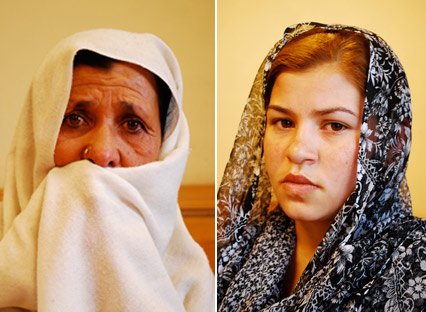KABUL - Zarghoona* has completed her three-month sentence at a prison in Kandahar Province, southern Afghanistan, but she is not allowed home because no male relative has shown up to guarantee that she will not run away from home again.
“All my family has abandoned me. I am dead for them but they [prison authorities] say they will only release me to a man from my family,” the woman told IRIN in a phone interview facilitated by an official who preferred anonymity.
Forced to marry an old, and mentally unstable man when she was 15, Zarghoona suffered sexual violence and regular beatings until she decided to run away from home. Early marriage is commonplace in a country in which, according to aid agencies, 43 percent of girls marry before they are 18.
“I wanted to die but not stay with that brutal man,” she said, adding that her husband and in-laws were beating her because she could not get pregnant.
Women’s rights activists and government officials confirmed that in many cases female prisoners could not be released due to the absence of a male relative.
“This is illegal but it happens quite often in Afghanistan,” said Suraya Subhrang, a women’s rights commissioner at the Afghanistan Independent Human Rights Commission (AIHRC) in Kabul.
“What should women without `Mahram’ [close relative such as father, brother, son or husband] do? Should they end their lives because there is no man to take care of them?” she said.
Golam Dastgheer Mayar, head of Kandahar’s main prison, said he was unaware of Zarghoona’s case but added that some female prisoners even wanted to stay in the prison after their sentence was over “because they have nowhere to go to”.
Biased justice?
While gender-based violence is prevalent, women have very limited freedom to escape the norms and traditions that dictate a subservient status for females, according to rights groups.
“Women are denied their most fundamental human rights and risk further violence in the course of seeking justice for crimes perpetrated against them,” the human rights unit of the UN Assistance Mission in Afghanistan (UNAMA) reported in 2009.

This woman (above left) was a failed suicide bomber, sentenced to 4 years. Shahperai (above right) a 22-year-old woman sentenced to 15-year for fleeing from a cruel husband.
"My life is destroyed now," said Shahperai. "When they announced in court that I have 15 years I was happy, because I have nowhere to go. At least I am safe here."
The First Post, Nov.16, 2010
Over 80 percent of Afghan women, particularly in rural areas, are illiterate and have very little or no awareness about their human rights, including the right to a fair trial, according to aid agencies.
For a woman to refer a case to the police or a prosecutor is widely believed to be pointless, as allegations are not usually taken seriously, properly recorded or acted upon. “Ultimately, authorities are not willing, or are not in a position, to provide women at risk with any form of protection to ensure their safety,” said the UNAMA report.
“Women face discrimination at courts,” said Wazhma Frogh, from the Afghan Women’s Network (AWN), a consortium of NGOs and individuals working on gender issues.
However, judicial officials reject the criticisms.
“These allegations have no real foundation. Women are treated fairly and [as] equally as men in courts,” Bahawddin Baha, head of the Supreme Court’s penal division, told IRIN, adding that the courts operated according to Islamic jurisprudence.
Access to formal justice institutions in Afghanistan is limited, especially in rural areas, and up to 80 percent of the population relies on traditional dispute-resolution mechanisms, especially as the formal justice system is viewed as ineffective and corrupt, according to an Afghanistan national human development report in 2007.
Elopement treated as crime
There is no clear guidance in Afghanistan’s penal code on how to deal with women and girls who run away from their homes, officials said, though the police arrest and prosecutors prosecute them.
“Our legal system is based on the Islamic Sharia [law] in which elopement is a sinful act for which, depending on the characteristics of a person, there could be different but minor penalties such as a 2-3 month sentence,” said the Supreme Court’s Baha.
Human rights activists condemn this, and say women and girls who flee from domestic violence must not be treated as offenders.
There are varying and sometimes opposing interpretations of the Sharia rules on elopement, said AWN’s Frogh.
“Treating elopement as a crime is related more to a predominant patriarchal culture in this country than to Islam,” she said, adding that in most cases running away from home was a last resort for women to save their lives.
Exclusion
Shame is part of the ordeal faced by imprisoned females, often regardless of whether she was the victim or perpetrator of a crime.
“People would prefer their females to die than go to prison,” said Haji Mir Lalai, a tribal elder in Kandahar.
“Families usually do not accept women and girls after their release from prison,” said Zubaida Payenda, director of the Kandahar Women’s Affairs Department (KWAD), adding that the social, economic and psychological scars of imprisonment affect women long after they are released.
Many females abandoned by their families, or fleeing domestic violence, seek protection at shelters managed by NGOs with private donations. There are 14 shelters in different parts of the country, each accommodating dozens of women in search of a new life, the AIHRC said.
But in Kandahar Province, there is no such shelter, which is why women prisoners without a family have problems being released, while others who suffer domestic violence have nowhere to run.
“We want to build a shelter in Kandahar but we need funds and support,” said Payenda of the KWAD.
*Not hear real name



